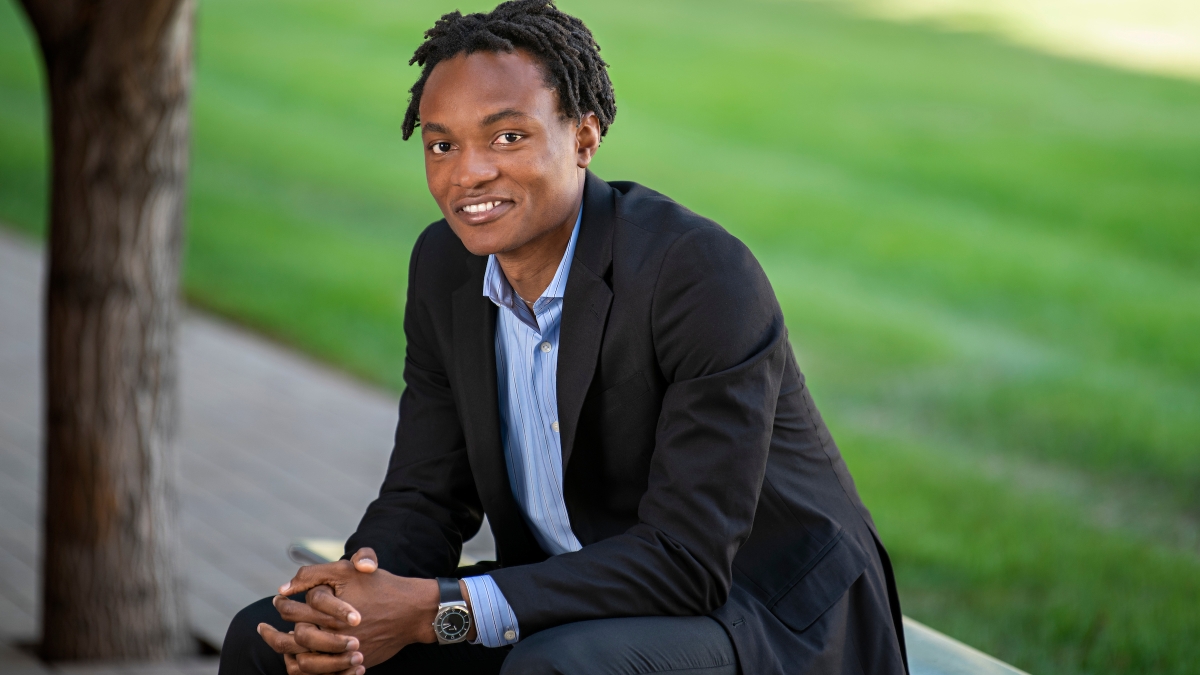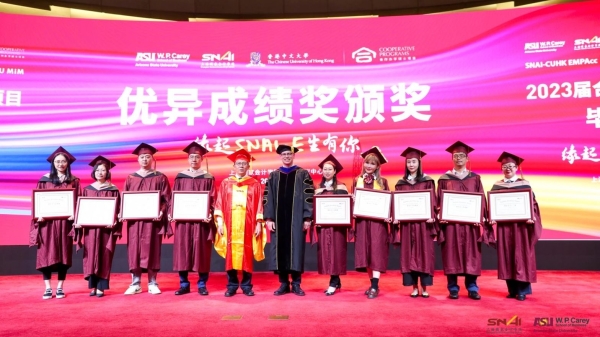MBA Outstanding Grad combines law and business for maximum impact

W. P. Carey School of Business Outstanding Graduate Student Chikezie “Chike” Anachu was also named one of Poets & Quants' "Best & Brightest MBA" students this year.
Editor's note: This story is part of a series of profiles of notable spring 2022 graduates.
Chikezie “Chike” Anachu was midway through his law degree when he realized more school was in his future.
“In law school, I often found myself wondering about the real impact of legal concepts and principles on business performance, especially how business-friendly regulations and policies could be used to incentivize the growth of small and medium enterprises,” explained Anachu. “Naturally, this curiosity led me to consider attending business school.”
Several years down the road, and the Lagos, Nigeria, native and W. P. Carey School of Business Outstanding Graduate Student is graduating with his MBA and has a job lined up in Dallas as an associate at McKinsey & Co. He was also named one of Poets & Quants' "Best & Brightest MBA" students this year.
Anachu shared more about his MBA experience, his most valuable graduate school lessons, and what he would tackle with $40 million.
Question: What’s something you learned while at ASU — in the classroom or otherwise — that surprised you or changed your perspective?
Answer: One of the most profound things I learned was that leadership isn’t linear. Through involvement in student clubs and organizations, I came to realize that there will be many ups and downs in leading teams and organizations, and that’s OK. Typically, when we think of leadership, we hear strong stories of success, of getting the job done no matter what. But the down moments are often relegated to footnotes. During my time here, I have learned that moments of strength and weakness are equally important in a leader’s journey, because what matters is consistency, staying the course. Things will not always go right, and you should be prepared to adapt to those contingencies to achieve your set goals or pivot in a new direction.
Q: Why did you choose ASU?
A: Initially, ASU wasn’t on my radar, but in the early spring of 2020 a friend of mine recommended I check out the W. P. Carey MBA program. After comparing it to other schools within my consideration set, I chose ASU for its incomparable combination of value for money, quality education and optimal outcomes. As a graduate student, I wanted a program that offered the best combination of all these things so that I could justify the cost of taking two years away from work to return to school. ASU has exceeded my expectations on all three fronts, especially once considering scholarship opportunities. Looking back now, I realize how incredibly fortunate I am to have listened to my friend who advised that I apply to ASU.
Q: What’s the best piece of advice you’d give to those still in school?
A: I would say to make the most of it. Every minute spent on campus is very special. You’re surrounded by so much intelligence, so many cool and bright people. And you should get to know them, learn from them and share with them. Someday when you’re graduating, you will realize the magic of an academic environment is not just the classroom learning you gained, but the ways in which you grew personally, the connections you made and the challenges you overcame. If you play it safe and never embrace the full potential of a campus environment, especially one as vibrant as ASU, you not only shortchange yourself, but you will have deprived others of the opportunity to get to know you and help shape your story.
Q: What was your favorite spot on campus, whether for studying, meeting friends or just thinking about life?
A: McCord Hall was my favorite spot on campus. It’s such a modern building with many resources for graduate students. I loved to use the team rooms for personal study time and team meetings. In addition, something I especially loved about McCord was the opportunity to bump into classmates from time to time and catch up on what’s going on in their lives. You never know who you are going to meet at McCord when you go there — classmates, friends, faculty, strangers that become friends, etc., and I found that quite exciting.
Q: If someone gave you $40 million to solve one problem on our planet, what would you tackle?
A: I would tackle global hunger and malnutrition. I think this is a fundamental problem we have to address for the future of our planet. As climate change accelerates, entire populations are at risk of losing access to not only food sources, but their livelihoods too. Already, too many kids grow up in homes where there is no guarantee of a single meal a day, not to talk of three. Those kids are often forced to fend for themselves or become targets of abuse. Moreover, without proper nutrition, kids are mostly unable to unlock their full potential, physically, academically and otherwise. In today’s world, where we have the capacity to grow enough food to feed the entire planet, hunger and malnutrition really should be a thing of the past. Unfortunately, it is not. Without hesitation, I would invest the $40 million into sustainable agriculture and food storage systems that have the potential to strongly advance food security for vulnerable populations globally.
More Business and entrepreneurship

New ASU certificate to address veteran underemployment
Veterans and military spouses bring a wealth of talent to the corporate world. Unfortunately, human resources and…

ASU China Executive MBA ranked No. 7 in world by Financial Times
In the 2024 Financial Times rankings for Executive MBA (EMBA) programs, Arizona State University's W. P. Carey School of Business…

ASU, Ghana partnership enhances supply chain practices in Africa
As a New American University, ASU defines the communities it serves as including both its backyard neighbors and colleagues…